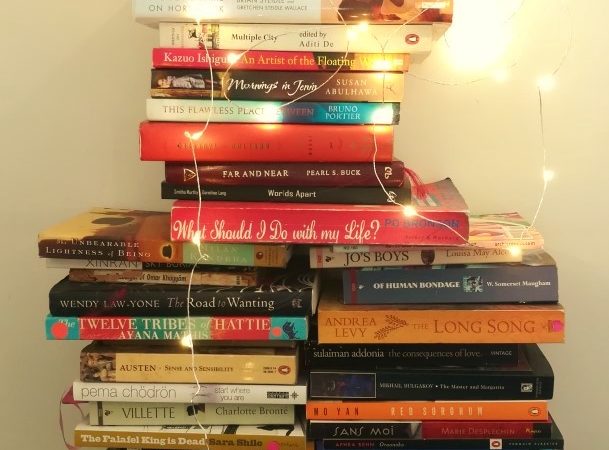In February, I read a lot of books with my old friend, Birdy. And it was like the old times – books were what drew us together as friends. There were so many weekends where our idea of fun was to just go to Landmark Stores in Forum Mall, and buy books that we are still yet to get around to reading. So, I am trying to read a few more books from my TBR bookshelf. The real one, that is, not the Goodreads one! As someone who started reading Children’s Literature quite late in life (I am not counting all the Enid Blytons and Nancy Drews I read as a kid!), is it any surprise that my favorite books this month apart from my love, Pema Chodron, were both from this genre?
I look forward to March. Traditionally, March has been good to me. Not just in terms of reading, but in terms of life. What would this month bring forth?
| Books read in February | 11 |
| Number of pages | 2,800 |
| Average book length | 254 pages |
| Average rating | 3.72 |
| Highest-rated book/s | The Phantom Tollbooth by Norton Juster and the Girl Who Drank The Moon by Kelly Barnhill |
Poetry
The Raven And Other Poems: Edgar Allan Poe
Rating: 4
Edgar Allan Poe was my faithful companion back in the 1990s. How many of his stories I devoured again and again! “The Tell-Tale Heart” still reverberates in my memory!
This set of poems in a lovely, illustrated edition by Peter Pauper contains haunting verse – macabre and spooky. ‘The Raven’ remains one of my favorite poems ever, and there are other classics such as ‘A Dream Within A Dream’ (Which also is one of my favorite songs) and Annabel Lee. One for the collector in you, this is a delight.
Non Fiction
The Pocket Pema Chodron: Pema Chodron
Rating: 5
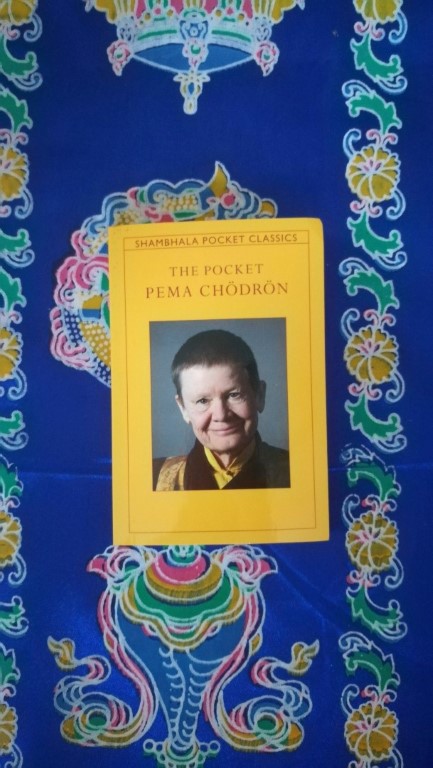 This delightful collection has some of the best of Pema’s teachings, little nuggets that, as the title suggests, you can carry in your pocket. Well, I carry it in my purse, but I have a feeling that this will quickly become my go-to book to understanding the groundlessness of fear, the scrutiny of embracing life as it is, and the relentless path to forgiveness and understanding.
This delightful collection has some of the best of Pema’s teachings, little nuggets that, as the title suggests, you can carry in your pocket. Well, I carry it in my purse, but I have a feeling that this will quickly become my go-to book to understanding the groundlessness of fear, the scrutiny of embracing life as it is, and the relentless path to forgiveness and understanding.
The short passages here are perfect to have any time during the day, and that’s how I intend to dip into this again. Like cups of tea on a warm snowy morning.
The Bright Hour: Nina Riggs
Rating: 3
I am often reminded of the Stoic line, “Memento mori,” or “Remember we must all die.” I keep telling myself that every time I fight with someone, get angry with someone, or treat anyone with anything less than compassion. I do that too often, in any case, no matter how many times I remind myself that we are just one word, one second away from death. It’s this same line that Nina Riggs quotes from her beautiful, evocative rendition and offering to life and death. How do you live when you know you have to die when we all lead such wretched lives even though we know we die too? Nina Riggs shows the way -not with the kind of heroic death that cancer invests you with – but because she was so beautifully flawed in life, loving, and living.
Her life was beautiful, and I can only wish that if mine ends tomorrow that I could say the same of mine too.
Classics
The Good Wives: Louisa May Alcott
Rating: 4
Many many years ago, when I was but a child-morphing-into-a-teenager, I had no bookshops to browse through, picking up any book I wanted on mere whim and whisper. There were no Kindles to buy books on immediate demand. There was just a City Central Library in a little corner in Bangalore, where I remember reading Louisa May Alcott’s ‘Little Women.’ I must have read it perhaps half a dozen times. I fell in love with the March family and I thought then that I was definitely the feisty, temperamental, Jo. That’s who I wanted to be when I will grow up, I thought. That hasn’t happened because I still haven’t grown up.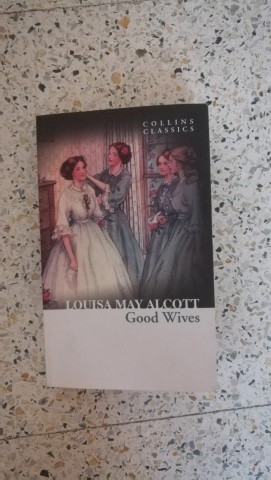
What I didn’t know then was that Alcott wrote sequels to ‘Little Women’. These books missed my attention when I studied Literature, and then later all through this modern reading life when I no longer go to the City Central Library and browse through its musty shelves that sparkle with book dust from words lying heavy and unattended all these years. The ‘Good Wives’ finally came to me on a regular walk in my regular bookshop. It was just such joy to relive the memories I had reading the ‘Little Women,’ and watching as Jo, Beth, Amy, and Meg blossom into adults. I laughed at the obvious Victorian ideal of family and good hearth that Alcott desperately sought to infuse into her characters. The feminist in me cringed at some of the passages, but I couldn’t help but laugh at dear ‘Teddy’ Laurence, and the transformation of each of the March children. Family is at the heart of the novel. Alcott is considered an early feminist – and there were many passages here that allude to that, but there are so many passages that would have Adichie screaming in anger. But rest assured that if your vision is to get married, start a family, and wait for the husband to come home while you maintain the house, obey everything the Lord says, and give up everything for this man, then you would love this book. That’s not my vision, but I loved the book anyway despite cringing through many of its lines. Sentiment, perhaps. A lot of it.
My Childhood: Maxim Gorky
Rating: 3
I had bought Maxim Gorky’s ‘My Childhood’ back in July 2006. For more than a decade, it was on my bookshelf, patiently waiting for its turn. Since I seem to have more patience with books these days, I picked up this classic, despite never having read any of Gorky’s works. His most famous work, of course, is ‘The Mother.’ His own mother features prominently in this autobiographical account of his childhood.
I could scarce believe the kind of childhood that Gorky had! Wild uncles and a tempestous grandfather prone to violence formed the basis of his childhood. His often absent mother was present more in her absence, and it is the kindness of his grandmother that kept Gorky through this violent and unreliable childhood. Reading the book was easy as Gorky writes in a rhythmic, fluid style. I do regret, however, not having read his earlier books before picking this one up. His childhood, like his pseudonym was ‘bitter’.
Fantasy/Children’s Literature
The Phantom Tollbooth: Norton Juster
Rating: 5
What an absolute delight it was to read what I think is one of the most clever books ever written! In a beautiful introduction to the book, Maurice Sendak describes this as a “marvel of a book,” and it is. Clever wordplay, puns, and a fantastical story that embraced simple values of living life well with awareness and understanding made this one of the best books of the year so far for me. The “glorious lunatic linguistic acrobatics,” made me chuckle, and even as you are carried away by the adventures and journeys of Milo, Tock, and the adorable Humbug, you realize that Norton Juster does more than take you on a beautiful journey.
Despite being written in 1961, much of the book holds true now, in the 21st century. All these allegorical monsters in Juster’s world have become only too real. The Demons of Ignorance taunt us, and we keep jumping to the Island of Conclusions rather than carry real conversations and communicate, and we supply Threadbare Excuses to account for our lack of Wisdom. There is no Rhyme or Reason in many of the things we do, we do many tasks out of routine than love, and it’s scary that these new-age tools of social media enable you to build your own Castles in the Air. Castles in the Internet, I should call it. An entire civilization of digital relationships. I wonder what Milo would make it of all today. And that cute Humbug. But wait, I am hungry, and want to have some division dimsums.
The Girl Who Drank The Moon: Kelly Barnhill
Rating: 5
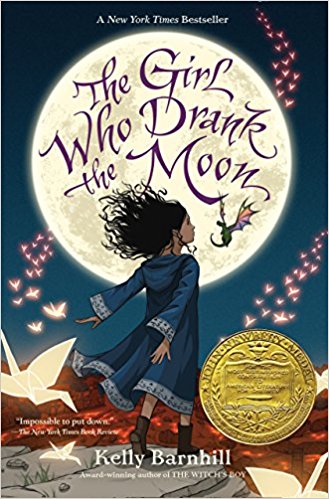 Lyrical, magical, and evocative, I find it hard to believe that this book is classified as children’s literature. Seldom has a story drawn me as closely as ‘The Girl Who Drank The Moon.’ I fell in love with the utter beauty of a girl who grew up on starlight and is ‘enmagicked’ by drinking the light of the moon. Kelly Barnhill has created some gorgeous characters in the heroic Xan, the monster Glerk, and my favorite, the Simply Enormous Dragon, the adorable Fyrian. Of course, Luna is the daughter of the moon.
Lyrical, magical, and evocative, I find it hard to believe that this book is classified as children’s literature. Seldom has a story drawn me as closely as ‘The Girl Who Drank The Moon.’ I fell in love with the utter beauty of a girl who grew up on starlight and is ‘enmagicked’ by drinking the light of the moon. Kelly Barnhill has created some gorgeous characters in the heroic Xan, the monster Glerk, and my favorite, the Simply Enormous Dragon, the adorable Fyrian. Of course, Luna is the daughter of the moon.
At heart, it seems like a fable built on a magical world where a volcano lies sleeping and where you can understand the caw of a crow, and an entire city is enmeshed in fear. But there is more than just stories, the ‘wild creatures’ as Patrick Ness wrote. At every step, Kelly Barnhill weaves in beautiful allegories on love, friendship, understanding, fear, and forgiveness. There is the Sorrow Eater who thrives on others’ sorrow. There is Antain who is wracked by remorse and guilt but who ultimately uses both these so-called negative emotions in a redemption of his soul. And through it all, the most beautiful lines I have ever read when Luna tells her mother : My love isn’t divided…it is multiplied.” How I want to share those lines!
And this: The heart is built of starlight
And time.
A pinprick of longing lost in the dark.
An unbroken chord linking the Infinite to the Infinite.
Magic. Beautiful magic. I am blessed to have read this book.
“How many feelings can one heart hold?… Infinite, Luna thought. The way the universe is infinite. It is light and dark and endless motion; it is space and time, and space within space, and time within time. And she knew: there is no limit to what the heart can carry.”
The Breadwinner: Deborah Ellis
Rating: 3
A quiet tale of heroic courage set in Afghanistan, ‘The Breadwinner’ is a charming tale that speaks of the horrors of war with a warm dignity. I have read quite a few books on war, but I don’t think I have read many written for a child.
Parvana’s voice is lyrical and affecting, and as I read certain chapters of the book, I was moved by how the things we take for granted are often missed in life elsewhere. That’s one of the reasons I travel. There is this passage where Parvana is able to take her sister, Nooria, outside. Her sister sits there, warming herself in the sun, and says she had forgotten how good that feels. Imagine! To be cooped up in a room all day, and to not be able to go out! There are lots of children’s books out there that may be all fun and fluff, but this is an important book for anyone to read so that we learn to respond to the world humanely – with courage, conviction, and compassion.
Contemporary Fiction
This is How It Always Is: Laurie Frankel
Rating: 3
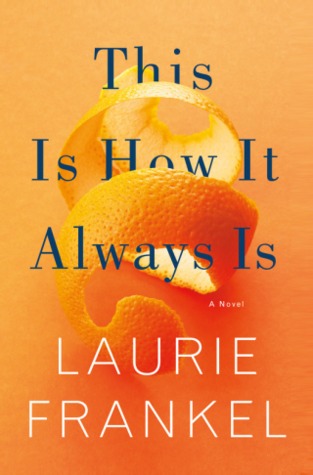 I started to write down my thoughts about this book, and then I found myself erasing sentences five times over. That is unlike me. I don’t usually revise what I write, but I found myself struggling to express my thoughts about “This is How It Always Is.” I read this as part of the Pop Sugar Reading Challenge – “Read a book with a LGBTQ+ character,” and I am glad that challenge is making me pick up books I normally wouldn’t have considered. My reading in this genre is scant, and I am trying to address that.
I started to write down my thoughts about this book, and then I found myself erasing sentences five times over. That is unlike me. I don’t usually revise what I write, but I found myself struggling to express my thoughts about “This is How It Always Is.” I read this as part of the Pop Sugar Reading Challenge – “Read a book with a LGBTQ+ character,” and I am glad that challenge is making me pick up books I normally wouldn’t have considered. My reading in this genre is scant, and I am trying to address that.
I have read only two books with a transgender character (although I am not sure if I should call Claude/Poppy that) in my life. This is a story of a family – large, multi-dimensional, and crazy. I have described most families in that sentence, I think. It’s the story of parenting and a story of love. What are the identities that we cling to? These days it seems more important than ever to assign labels of gay, straight, bi, trans, or anything else to ourselves. I have never understood this need to define the body we have been gifted with rigid labels like those. And Laurie Frankel tries to address some of the problems that come with such labels.
What I didn’t like was the overly complex sentence structure – there were sentences that were really long, and I had to re-read them to understand. I didn’t understand how Claude can be so wise when he is aged five. I didn’t understand the long diversion to Buddhism at the end. I didn’t understand the “poor Thailand” insertion. I certainly did not want to read about Grumwald as some sort of fairytale sub-plot. Because of these, I didn’t end up liking this book all that much, but there is much that is important, and some wisdom to take away.
The Man from Beijing: Henning Mankell
Rating: 2
A book that starts so promisingly and ends with a whimper! This book is a classic case of authoritis -the kind of syndrome where authors decide they must give 10023 of their opinions on world matters into one book. From a sleepy village in Sweden, Mankell just jets around the world, leaning into global matters of China’s rise, the Communist Party (who cares when there are 19 dead bodies in Sweden??), some bizarre family drama, and a lot of posturing on colonization.
This book had the vague feeling of “could have been so good, but isn’t.”
The Bear And The Paving Stone: Toshiyuki Horie
Rating: 4
 What a strange dream-like world Toshiyuki Horie has created in these three stories. I came across this book entirely by chance, but what caught my eye was that the publishers are Pushkin Press, which a friend of mine loves. So, my friend and I started reading this together, and I loved the interlacing of memory in all the three stories.
What a strange dream-like world Toshiyuki Horie has created in these three stories. I came across this book entirely by chance, but what caught my eye was that the publishers are Pushkin Press, which a friend of mine loves. So, my friend and I started reading this together, and I loved the interlacing of memory in all the three stories.
There is a sense of loss, of nostalgia, for the past, for what may have been, but Horie surrounds it with a gentle touch of wisdom. You don’t feel sad when you read about the loss. You just feel for Life, because this is what Life does to us. We are left with the memories of desire, of haunted ghosts of past regrets, and the utter magic of reliving our life through the sunlight-dipped glasses of memories.
